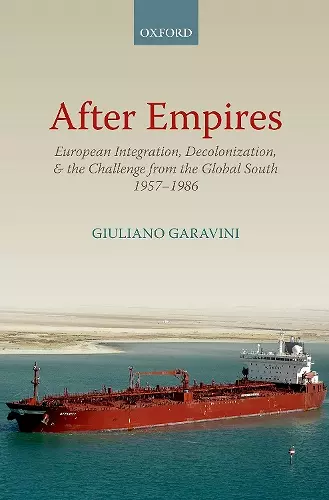After Empires
European Integration, Decolonization, and the Challenge from the Global South 1957-1986
Giuliano Garavini author Richard R Nybakken translator
Format:Paperback
Publisher:Oxford University Press
Published:25th Feb '21
Currently unavailable, and unfortunately no date known when it will be back
This paperback is available in another edition too:
- Hardback£147.50(9780199659197)

After Empires describes how the end of colonial empires and the changes in international politics and economies after decolonization affected the European integration process. Until now, studies on European integration have often focussed on the search for peaceful relations among the European nations, particularly between Germany and France, or examined it as an offspring of the Cold War, moving together with the ups and downs of transatlantic relations. But these two factors alone are not enough to explain the rise of the European Community and its more recent transformation into the European Union. Giuliano Garavini focuses instead on the emergence of the Third World as an international actor, starting from its initial economic cooperation with the creation of the United Nations Conference for Trade and Development (UNCTAD) in 1964 up to the end of unity among the countries of the Global South after the second oil shock in 1979-80. Offering a new - less myopic - way to conceptualise European history more globally, the study is based on a variety of international archives (government archives in Europe, the US, Algeria, Venezuela; international organizations such as the EC, UNCTAD, and the World Bank; political and social organizations such as the Socialist International, labour archives and the papers of oil companies) and traces the reactions and the initiatives of the countries of the European Community, but also of the European political parties and public opinion, to the rise and fall of the Third World on the international stage.
Offers a refreshing account of an organization that has managed to adapt to radically. * Edoardo Campanella, Project Syndacate *
Based on extensive multilingual research, including sources that were previously inaccessible to historians, this book is the best history of the Organization of the Petroleum Exporting Countries (OPEC) yet published. * Victor McFarland, Environmental History *
A well-needed and important contribution to the growing body of literature on the history of oil and energy that aims to transcend the confines of an American and European perspective * Rüdiger Graf, ARO *
It is rare to see a book on oil history that takes on the challenge of developing a truly global analysis while at the same time going into local depth when it comes to the oil histories of individual countries * Per Högselius, The Journal of European Economic History *
Garavini suggests that OPEC can still play a valuable example for other raw materials producers even in a post-hydrocarbon age and that it can play a valuable role in the fight against climate change by serving as a carbon tax "collector" and preventing any price collapses * Anand Tropani, The Middle East Journal *
The sweeping analysis merits extended citation because it exemplifies the breakneck pace, learned insight, and wide range that will make After Empires a touchstone in the histories of decolonization and globalization. * Christopher R.W. Dietrich, H-Diplo *
After Empires: European Integration, Decolonization and the Challenge from the Global South (1957 - 1986) is a thoroughly researched, lucidly written and highly original argument about the complex links between decolonization, post World War II debates about development, and the ideas about the process of European integration. * Mary Nolan, Journal of European Integration History *
The book has the merit of analyzing the influence of different actors: individuals, social movements and political parties. It will be a fundamental historical framework for all of those who are interested in the external policies of the European Community (EU). * Véronique Dimier, Revue Française de Science Politique *
ISBN: 9780198867715
Dimensions: 235mm x 155mm x 17mm
Weight: 462g
304 pages